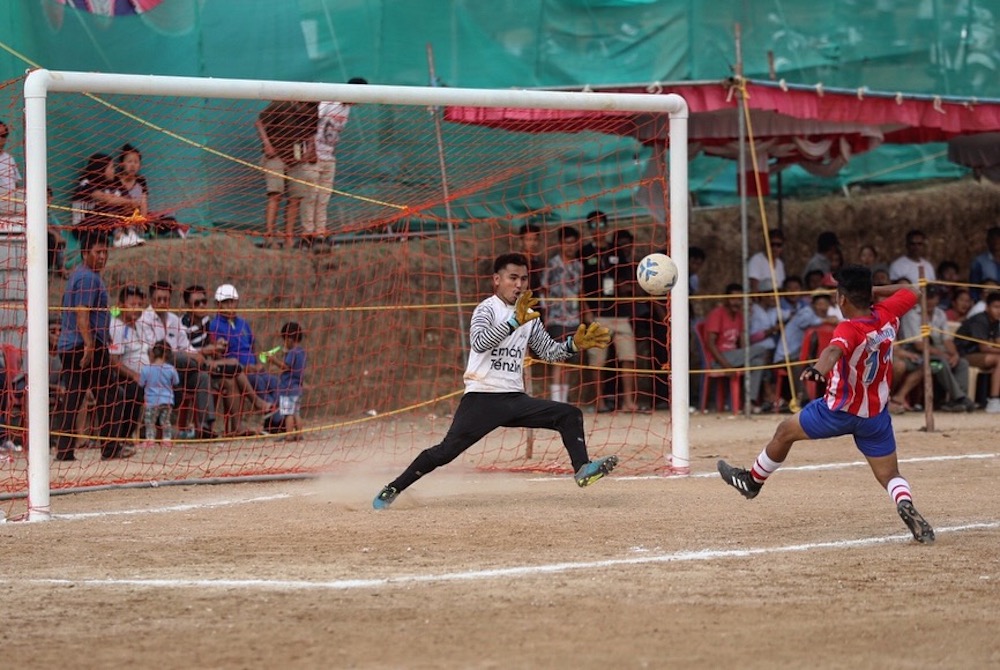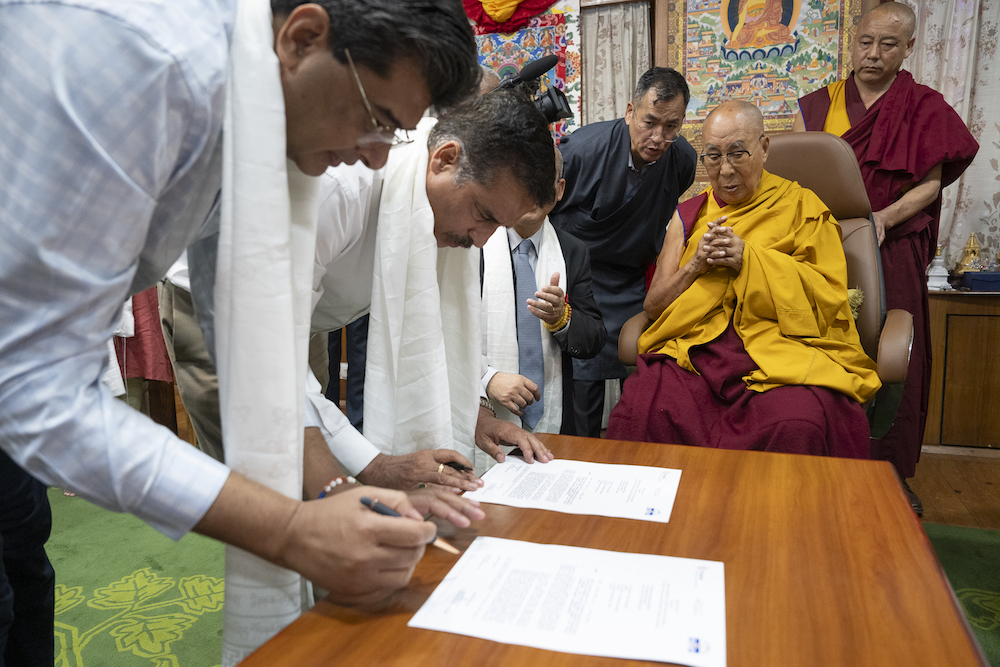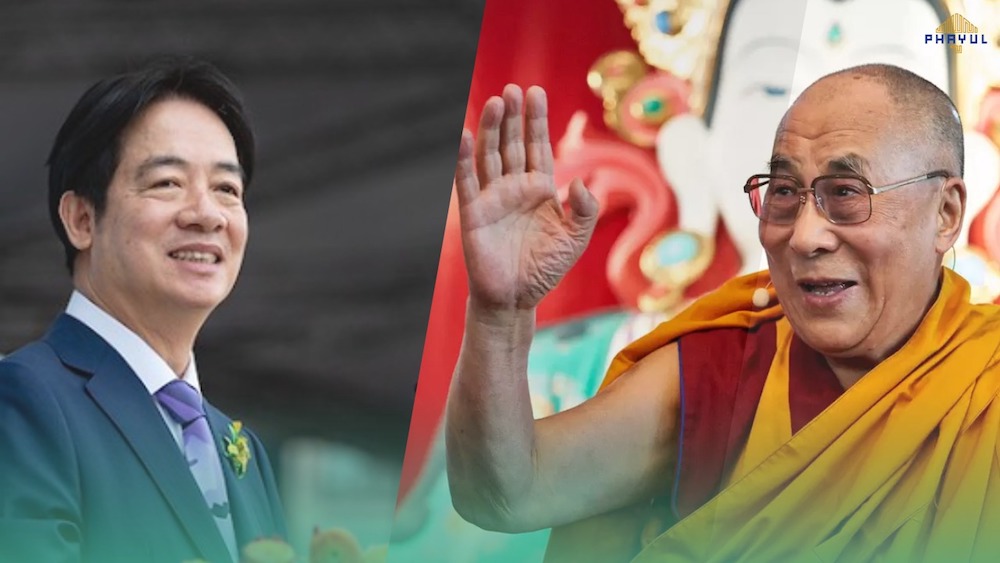By Mike Leonard
To many people in Bloomington, he’s known as Thubten Jigme Norbu, Professor Norbu, or Taktser Tulku or Taktser Rimpoche, the title bestowed on him as the reincarnation of a famous Tibetan monk.
To the world, he’s the eldest brother of the 14th Dalai Lama of Tibet, a leading figure in the Tibetan independence movement and a tireless advocate for the preservation of Tibetan culture.
On Sunday, the 81-year-old Norbu will welcome his Nobel Peace Prize-winning brother to Bloomington to celebrate a long-held ambition with the dedication of the Chamtse Ling Temple on the green and rolling 100-acre grounds that also provide a home to the Tibetan Cultural Center founded by Norbu.
“This has been his dream, to create an interfaith temple where not only Buddhists but people of all faiths can come and share the common goals of religions,” his younger sister, Jetsun Pema, explained this week.
“It’s probably the first in the United States. The first I know of to not just be a Buddhist temple but an interfaith temple,” his wife, Kunyang, said. “He started with the Tibetan Cultural Center to educate people about Tibet, but this is the next step.”
The creation of the temple and the ability to attract luminaries such as Muhammad Ali to the ceremony reflect the respect afforded both Norbu and his brother, the Dalai Lama.
Born into a family of simple farmers in the village of Tengster in the eastern Tibetan province of Amdo, Norbu was recognized at an early age as the reincarnation of highly regarded monk, Taktser Labrang. “To any Tibetan family, to have a reincarnated lama born into your family is a great honor and privilege,” Pema said.
Sixteen years younger than Norbu, Pema remembers traveling to visit her exalted eldest brother when he was studying in the monastery, and receiving rare visits from him in their native village. “His being a Rimpoche (“precious one”), we as children had to behave ourselves,” she recalled with a smile. “He was a young man and he was our brother, but he was a very important man.”
Sixteen children were born into the family, and while just seven survived, three sons were recognized as Rimpoches in the Galugpa sect of Tibetan Buddhism.
Norbu had gone far beyond where any family member had previously gone and was bestowed spiritual and material rewards the likes of which the family had never seen until younger brother, Tenzin Gyatso, was named the 14th Dalai Lama. In Tibetan society, no person outranks the Dalai Lama, even in his own family, and Norbu never had a problem deferring to his younger brother.
By being the Dalai Lama’s brother, however, Norbu became the target of attention when Chinese troops and other operatives began moving into eastern Tibet in 1949 to expand the reach of Mao Zedong’s emerging communist state.
Chinese officials occupied the Kumbum monastery when Norbu was abbot and monitored his every move. Continually, they challenged his religion, his loyalty to the Dalai Lama and his love of country. “They tried to brainwash him,” Pema said.
If Norbu didn’t have an independent streak before the Chinese arrived, he grew to despise his subjugation as the months wore on. As he writes in his autobiography, Tibet Is My Country, Chinese officials not only tried to motivate him to approach the Dalai Lama and persuade the secular and spiritual leader of Tibet to welcome the Chinese army into the Tibetan capital as “liberators,” they also promised him the position of governor-general of the new Tibet if he would kill his own brother, should the Dalai Lama not cooperate.
Norbu was horrified. A scene from the film Seven Years in Tibet fairly accurately portrayed the dramatic scenario when Norbu fooled the Chinese into thinking he was about to do their bidding when he traveled to the capital of Lhasa and instead warned his brother of the plot and implored him to never trust the invaders.
With that, Norbu’s own fate was sealed. He would have to escape Tibet or be killed by the Chinese. First he made his way to Formosa, now Taiwan. After almost two years there and in travels to draw attention to the Tibetan plight, he immigrated to the United States.
For several years, Norbu continued to travel the world on Tibet’s behalf. “He would always send me postcards from his travels,” his sister said. While many Tibetan families become separated when one or more members become monks, expatriation ironically made their family closer, she said.
Norbu also worked with the CIA on various plans to stage an insurrection or invasion of his native land. Some say these plans initially failed to gain support in Washington, D.C., because the domestic fear of communism spread by Sen. Joseph McCarthy diverted attention from foreign affairs. “We were not like Kuwait with all the oil the world wanted,” Pema suggested.
While scant evidence is available from official U.S. channels about the CIA’s on-and-off attempts to support a Tibetan insurrection, Pema said she remembers it all very clearly. “They trained in Colorado and all of that gave a lot of hope to Tibetans,” she said. “Some Tibetans trained in the U.S. were even dropped into Tibet, but they were captured and tortured by the Chinese. To us, they were heroes.”
After spending most of the 1950s traveling, Norbu took an appointment at the University of Washington in 1960 and it was there it met his bride-to-be. He was approaching 40 and she was just 16. “You have to remember, this was not unusual in traditional Tibetan culture,” Kunyang said this week. “Times change.”
She recalls seeing Norbu when she was a student at a British school in India and he was an important emissary visiting her family, high-ranking in the Sakya sect of Tibetan Buddhism. When she met Norbu in Washington as a young woman, “I remember envisioning an older lama in robes and instead he was this handsome man in a nice suit and tie.
“He was humble, polite, kind — which has never changed,” she said.
The couple would give birth to three sons, all born before Kunyang’s 21st birthday: Lhundrup, Kunga and Jigme. All live in Bloomington.
The family moved to Monroe County after Norbu had spent 1961-65 as assistant curator of the Tibetan Collection at the Museum of Natural History in New York City. They were already weary of trying to rear young sons in an urban environment when Denis Sinor of IU approached Norbu about joining the department of Uralic and Altaic studies at the university in Bloomington. “I was greatly impressed and felt that Bloomington would be an ideal place for me to raise my family,” Norbu writes in his autobiography. “It was anything but a rural backwater.”
Norbu taught classes in Tibetan civilization, religion, culture and politics. And he continued to promote the Tibetan cause. In 1995, he took a bold step, going beyond the Dalai Lama’s public stance on the future of Tibet, which calls for negotiation and mediation with the Chinese. With Ball State University psychology professor Larry Gerstein, he formed the International Tibetan Independence Movement, a group that has helped sponsor numerous “walks for independence” that are aimed at raising Western awareness of the continuing plight of Tibet under Chinese rule.
“He’s a person who is committed to justice and to compassion. He’s someone who’s very generous. And he has a great sense of humor — he’s a prankster,” Gerstein said this week. On more than one occasion, Gerstein said, he’s presented Norbu with a traditional white scarf as a show of respect upon greeting, only to have Norbu place the scarf back around his neck and pull it uncomfortably tight.
“He’s very humble,” Gerstein said, noting that Norbu often politely declines the scarves. “I’ve seen him get upset when people call him Rimpoche.”
Although Norbu is still recovering from a serious stroke more than a year ago, his wife and his sister each say that they’ve seen him talking more and laughing more as he welcomes old friends to town and anticipates seeing his brother, the Dalai Lama.
There might be more to the reunion than meets the eye. According to Tibetan lore, the 13th Dalai Lama and the famous monk, Taktser Labrang, were such good friends that they wished they would one day be reincarnated as brothers.
The men recognized as the 14th Dalai Lama and the reincarnation of Taktser Labrang are indeed brothers in this life, looking toward a cherished reunion this weekend.
Mike Leonard – 81`2- 331-4368; leonard@heraldt.com.









